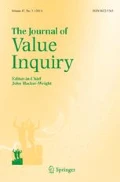Notes
See Derek Parfit, Reasons and Persons (Oxford: Oxford University Press, 1984), p. 24; see also R. M. Hare, “Comments,” in Hare and Critics, eds. Douglas Seanor and N. Fotion (Oxford: Oxford University Press, 1988); Thomas Hurka, Virtue, Vice and Value (Oxford: Oxford University Press, 2001), pp. 246–247; T. M. Scanlon, “Levels of Moral Thinking” in Douglas Seanor and N. Fotion, eds., op. cit; Michael Stocker, “The Schizophrenia of Modern Ethical Theories,” Journal of Philosophy, vol. 73, 1976; and Michael Stocker, “How Emotions Reveal Value and Help Cure the Schizophrenia of Modern Ethical Theories,” in How Should One Live?, ed. Roger Crisp (Oxford: Oxford University Press, 1996).
Glen Pettigrove, “Is Virtue Ethics Self-Effacing?,” Journal of Ethics, vol. 15, 2011, p. 191; also see Simon Keller, “Virtue Ethics is Self-Effacing,” Australasian Journal of Philosophy, vol. 85, 2007.
See Joel A. Martinez, “Is Virtue Ethics Self-Effacing?,” Australasian Journal of Philosophy, vol. 89, 2011, pp. 279–280.
See Jeremy Bentham, Introduction to the Principles of Morals and Legislation (Oxford: Oxford University Press, 1907), ch. 4, section 4.
See R. M. Hare, Moral Thinking: Its Levels, Method, and Point (New York: Oxford University Press, 1981); see also William Langenfus, “Implications of a Self-Effacing Consequentialism,” Southern Journal of Philosophy, vol. 27, 1989; Peter Railton, “Alienation, Consequentialism and the Demands of Morality,” Philosophy and Public Affairs, vol. 13, 1984; and Henry Sidgwick, The Methods of Ethics 7th ed. (London: Macmillan, 1907).
See Bernard Williams, Moral Luck (Cambridge, England: Cambridge University Press, 1981), pp. 17–19.
See Damian Cox, “Agent-Based Theories of Right Action,” Ethical Theory and Moral Practice vol. 9, 2006; see also Hurka, op. cit., pp. 246–247; Simon Keller, “Virtue Ethics is Self-Effacing”; and William Ransome, “Is Agent-Based Virtue Ethics Self-Undermining?”, Ethical Perspectives, vol. 17, 2010.
See Michael Slote, Morals from Motives (New York, Oxford University Press, 2001).
See Rosalind Hursthouse, On Virtue Ethics (Oxford: Oxford University Press, 1999).
See ibid., ch. 7; see also Daniel Russell, Practical Intelligence and the Virtues (Oxford: Oxford University Press, 2009), pp. 48–49.
See M. Byron ed., Satisficing and Maximizing: Moral Theorists on Practical Reason (Cambridge, England: Cambridge University Press, 2004).
See Henry Sidgwick, op. cit., p. 490. See also Bernard Williams Utilitarianism: For and Against (Cambridge, England: Cambridge University Press, 1973), p. 139, and Williams, Ethics and the Limits of Philosophy (London: Fontana, 1985), p. 109.
See Robert M. Adams, The Virtue of Faith and Other Essays in Philosophical Theology (New York: Oxford University Press, 1987), chs. 7 & 9.
See Bernard Williams Utilitarianism: For and Against, pp. 103–104.
See Spencer Carr, “The Integrity of a Utilitarian,” Ethics vol. 86, 1976; see also Gregory Trianosky, “Moral Integrity and Moral Psychology: A Refutation of Two Accounts of the Conflict between Utilitarianism and Integrity,” Journal of Value Inquiry vol. 20, 1986, pp. 279–288.
I would like to thank three anonymous referees and Thomas Magnell, the Editor-in-Chief of the Journal of Value Inquiry, for their comments and suggestions.
Author information
Authors and Affiliations
Corresponding author
Rights and permissions
About this article
Cite this article
Cox, D. Judgment, Deliberation, and the Self-effacement of Moral Theory. J Value Inquiry 46, 289–302 (2012). https://doi.org/10.1007/s10790-012-9348-7
Published:
Issue Date:
DOI: https://doi.org/10.1007/s10790-012-9348-7

